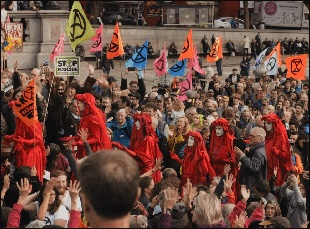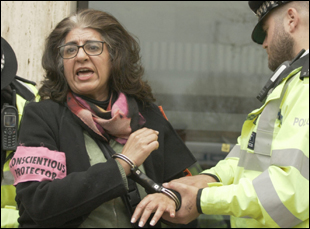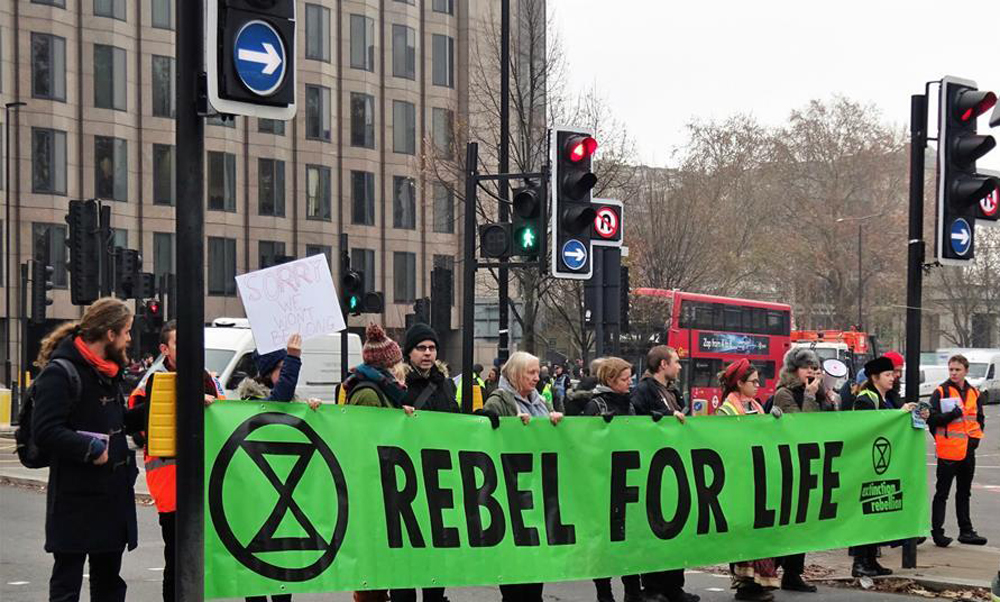One may not give much attention to the first thing you hear in “Rebellion,” a stray laugh as the co-directors Elena Sánchez Bellot and Maia Kenworthy sit down for their interview with Savannah Lovelock, a leader in the activist movement Extinction Rebellion’s Youth sector, but it becomes unusually resounding as the electrifying portrait of the activist movement wears on, allowing its members to be seen as people before you even become aware of what they stand for. In a film where XR co-founder Roger Hallam can be seen making the request of Bellot and Kenworthy to avoid using the term “climate change” – in fact, he is the only one to use these words in the entirety of the doc – there is a refreshing priority placed on people rather than their politics as they go about the messy work of making change in a world where being seen entirely in terms of ideology has prevented the nuance where compromise can occur.
Lovelock may chuckle at Bellot and Kenworthy because she’s at a loss for words when the filmmakers ask, “If you could go back in time, would you join Extinction Rebellion again?” a particularly loaded question when Hallam is her father, though she joined the organization separate from his influence and “Rebellion” may be one of the most riveting films about activism to emerge in some time when it shows how many can unite under a common cause while having such different perspectives on the best way forward. The peek inside feels especially singular when the filmmakers embedded with XR well before they took the world by storm with a successful protest in April 2019 where members staged a takeover of the area around Parliament Square, forcing office workers in one of London’s busiest business sectors to change routes and ultimately the government to acknowledge there was a climate emergency.
Rather than celebrate a well-earned victory, a recognition of the power XR has leads to internal disagreement over where to take it next as Hallam and Farhana Yamin, a lawyer who helped craft policy for the landmark Paris Agreement before seeing XR’s direct actions as a better way towards achieving meaningful change, butt heads and concerns crop up throughout the movement about whose voices are being heard at the highest levels as divisions in age and race start to reveal themselves. The turmoil within only makes what XR is able to accomplish all the more remarkable, but with the time they invest, Bellot and Kenworthy are able to show how challenging it can be to keep momentum going for any movement when public attention is fleeting and progress never takes a clearly defined path, leaving even the most well-intentioned to question what’s the right course of action.
Rousing, provocative and realistic about the practicalities of improving the world, there could be no better opening night film than “Rebellion” for this year’s Human Rights Watch Film Festival, taking place physically in New York for the first time in two years but available to stream anywhere in the U.S. between May 20th-May 26th, all accompanied with Q & As that not only concern the making of the film but how they could inspire steps forward for a variety of pressing issues. Straight from Sundance, the festival will be hosting “The Janes,” Tia Lessin and Emma Pildes’ chronicle of the female-led underground organization in Chicago that provided safe abortions to women in need before the Roe V. Wade decision made it legal in 1972, and Snow Hnin Ei Hlaing’s “Midwives,” profiling a Myanmar-based doctor providing care to the violently persecuted Muslim Rohingya community in the region over five years, in addition to other recent festival favorites such as Ike Nnaebue’s immigrant travelogue “No U-Turn,” which played to cheers at True/False, and Dina Amer’s arresting Venice Film Fest selection “You Resemble Me,” a dramatic reconstruction of a Parisian woman’s radicalization into becoming an infamous suicide bomber.
The festival will also present three world premieres with “Up to G-Cup,” about Northern Iraq’s first lingerie store that becomes a safe haven for women in the region to speak freely, “The New Greatness Case,” a Russian documentary about the state’s arrest of a teenager pushed into a criminal plot by a secret agent who infiltrated her chat room, and “Clarissa’s Battle,” following the community organizer Clarissa Doutherd as she rallies her hometown of Oakland around better child care and early education while having the time to be the best mother she can be to her own kids. All in all, it’s a galvanizing lineup, accessible both in terms of presenting intimidating subject matter through an inviting lens and widely available virtually as well as physically and recently, Bellot and Kenworthy kindly spoke of their own excitement about being the festival’s opening night film and the considerable amount of work it took to get there, allowing their subjects to be seen in all their dimension.

Elena Sánchez Bellot: You don’t. [laughs] You go into it with blind faith otherwise I’m not sure you would go into it.
Maia Kenworthy: Yeah, we could both shoot and edit, so that’s made a big difference because for a lot of the film it’s just been us with a camera, turning up and getting to know people and then editing when we could. We did get an editor on board finally to help us really pull it into a feature and having an outside perspective, but it helped we had the skillset, and every [film] brings its new challenges, but because we’d never made a feature before, there was also a slight feeling of like, “Can we do this? I guess we’ll find out.” And just keep going and see what happens.
Elena Sánchez Bellot: We’ve known each other for quite a while. We met on a film MA that we did in 2014 and since then we’ve worked together on small things, but this is the first feature we’ve made together, so it’s been really nice to have each other.
What got your attention about the XR?
Elena Sánchez Bellot: We met them very early on. That first press conference that you see in the film in 2018, that was the first time we ever filmed them and a friend of ours who made a film about the Occupy movement got in touch because unsurprisingly, there were people who were in the Occupy movement who were then in XR. She did a call-out because she had a full-time job and couldn’t do it herself at the time and got in touch with lots of filmmakers [because she] thought, “Okay, there’s some characters here, there’s a story, so Maia and I responded to that. Very quickly, we met Gail and Roger and thought they were really compelling and charismatic and we were also struck by how many people we were meeting that were doing this for the first time in their lives and were just so committed. We met Farhana, which was a really big moment of this person who on the inside [of the U.N.], the people that are meant to be fixing this for 30 years, saying, “No, no, no, this isn’t working and I’m going to join forces with XR” — that felt like, “Okay, there’s something here. Let’s keep showing up” and they were talking about a rebellion in London and we’re like, “Okay, let’s see what happens.”
One of the most impressive things was the variety of perspectives within the XR you bring into this. How did you figure out who to talk to?
Maia Kenworthy: From the beginning, there were different people coming into this group and we met Farhana, Roger and Gail and they’re all quite different – this farmer from Wales and this U.N. lawyer, early on we were like, “alright, very different people literally working side-by-side.” Then as we kept filming, more and more viewpoints came to light. We met XR Youth, [who] formed a bit later anyway, about a year into filming and we met Savannah and we [thought], “Okay, we really need to get to know more about her and where she’s coming from.”
A lot of those stories came about from the fact that we were willing and patient to let things unfold and we were opento them. We didn’t come to this with an agenda or [some] set thing we wanted to follow. We were curious and let ourselves learn about all these different people and what was interesting about it was there are a lot of stereotypes around activism and we definitely found our assumptions challenged. That was important to us that we kept looking and let these viewpoints come through because I think a lot of people just assume, “They’re all like this or they’re all like that,” and it’s not what you think.
Did anything happen that took this in a direction you didn’t expect?
Elena Sánchez Bellot: At the very beginning, no one knew what was going to happen in April and then it was this resounding success and thousands of people showed up, a thousand people got arrested. It was the biggest act of civil disobedience in British political history and then a month later the UK declared a climate emergency, and we had been there since the beginning so we had their trust. That was one of the first moments where we were like, “We captured something” in the same way that they did. They captured a moment and an energy of people and we were there recording history.
Then [when] we met XR Youth and Savannah and Alejandra, we both felt really passionate about that, adding more and more layers to make a story that was personal to bring the audience closer to those at the hearts of grassroots efforts rather than like Maia was saying, these prejudiced categories that are very one-dimensional portrayals of activists. Those layers came out after meeting XR Youth and Savannah and her story with Roger added a lot of complexity that made us feel like this is a story that we could make into a feature-length film.
Maia Kenworthy: We did the interviews much, much later, so by the time we got around to them, we really knew the people we were interviewing, they trusted us and it mattered to us that we did already have a good understanding of their stories. We had long conversations with them and done lots of filming, but also spent evenings with them and there are a lot of shared experiences with a film like this because you’re not always filming because you can’t or they are actually really emotional in that moment and what they need is to connect with you, so we’d be that person that did listen or care. By the time you get around to [the] interview — and obviously you do then have to be aware as a filmmaker of the power that you have because you’re taking other people’s stories — but to get to that point, we spent that time already so they were willing to go there in the interview. It was still a case of talking to them, letting them watch the film and be part of its creation still to make sure it was truthful, but it really, really mattered to us.
Elena Sánchez Bellot: Also, the fact we were independent also really helped because we didn’t have a TV channel or this big exec telling us to amp up the drama or drive the story. It could be more collaborative, which sometimes when you have a commission is more difficult.

Maia Kenworthy: Yeah, the other coverage we’d seen was pretty one-dimensional and although it hadn’t all been negative, it was either ridiculing or at worst, it’s painting activists as dangerous, especially when that’s then playing into this government agenda with this police bill that was coming through as a direct result of effective groups that were having a massive impact like Extinction Rebellion and the Black Lives Matter movement in 2020. We thought it was important for our film to be an antidote to some of those narratives [as a] much more human portrayal that essentially counters those narratives that the media sometimes does to sell stories, not necessarily thinking beyond that, but we’re thinking that’s just not good enough because we’re at a moment where we need activism more than ever. These people have done amazing things and they’re continuing to push hard and put themselves at risk, so we thought it was important that our film was helping to build movements than a quick story that’s ultimately going to play into a very nasty government agenda.
Elena Sánchez Bellot: And the power of documentaries [is] that people can connect emotionally to things that otherwise might feel very abstract. We didn’t want to make a propaganda film for XR because that actually works against them because people who could be critical of XR watch this film and they’re not really going to engage with it on the same level whereas if this is like “warts and all, organizing is messy, but even when things are messy, you can create change,” that it would make them see them in a different light. One of the big things we noticed so much about XR portrayals in the media was that they were being portrayed in such a homogenous way, [and the question becomes] how can you bring this many people together and expect that they’re going to think the same thing – obviously not. And that’s not a bad thing. There’s a lot of creativity in that messiness.
Maia Kenworthy: Yeah, there’s often this idea that activists are really self-righteous and they think they know best, and are unbearable people. Actually, we found that there was a lot of humility within the group, even with people with strong ideas and tactics. There’s still moments where they’re like, “Ok, well that didn’t go well” and [ask] why not and constantly open to having these critical conversations. It’s not like everyone was clapping each other on the back and being so smug about it. They were honest with the fact that they were all just trying and it’s all a bit of a desperate last resort doing civil disobedience. No one really wants to be sitting in the middle of a motorway with a sign making people very angry who are trying to go to work. That humility point was really important for us and being honest about things going wrong was important, that it wasn’t presented as they’re heroes because they wouldn’t want that either. They don’t feel like that.
What’s it been like getting this out into the world?
Maia Kenworthy: The best part is when we are there with people seeing it for the first time and we get to speak to [audiences] afterwards because actually every screening is different. You get people coming forward with totally different takes on it or people they connected to, so that’s really lovely to see all the things we’ve weaved together have an impact on someone somewhere.
Elena Sánchez Bellot: And when you’re making documentaries, it was just me and [Maia], so you’re often working in isolation and it can really feel lonely and then actually connecting with people and seeing the fruits of your labor is really rewarding.
Maia Kenworthy: When you’re so close to a film you’ve watched a hundred times, it’s like, “Is it interesting? Are people going to connect to anything in the film?” Having those real in person conversations with people reflecting on it, it’s great to see.
“Rebellion” will screen at the Human Rights Watch Film Fest in person in New York at Walter Reade Theater at Lincoln Center on May 20th at 7 pm and available anywhere in the world virtually from May 20th through 27th.




